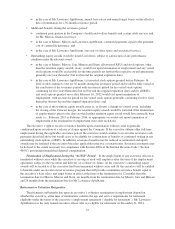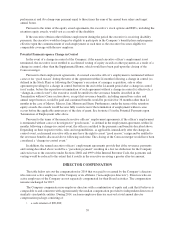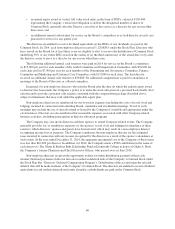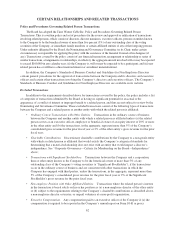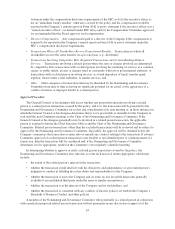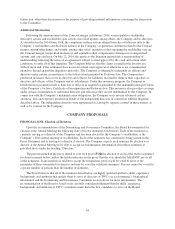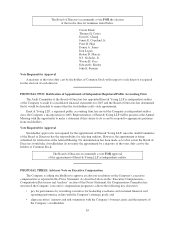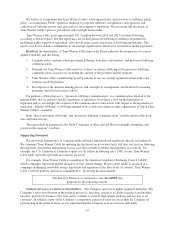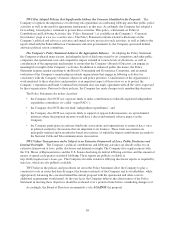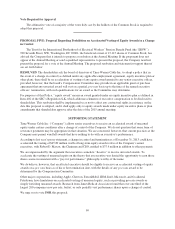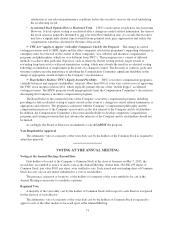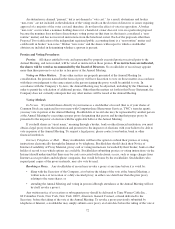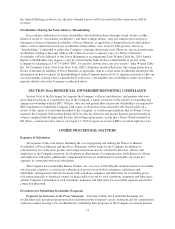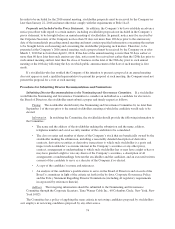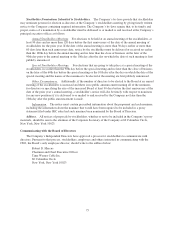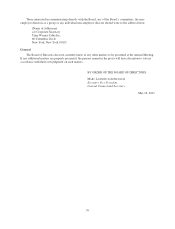Time Warner Cable 2015 Annual Report Download - page 73
Download and view the complete annual report
Please find page 73 of the 2015 Time Warner Cable annual report below. You can navigate through the pages in the report by either clicking on the pages listed below, or by using the keyword search tool below to find specific information within the annual report.
We believe it is important that Time Warner Cable’s lobbying positions, and processes to influence public
policy, are transparent. Public opinion is skeptical of corporate influence on legislators and regulators and
controversial lobbying activity may pose risks to our company’s reputation. We encourage full disclosure of
Time Warner Cable’s policies, procedures and oversight mechanisms.
Time Warner Cable spent approximately $31.3 million between 2010 and 2013 on federal lobbying,
according to Senate reports. But this figure may not include grassroots lobbying to influence legislation by
mobilizing public support or opposition. Also, not all states require disclosure of lobbying expenditures. The
reports also do not include contributions to tax-exempt organizations which write and endorse model legislation.
Resolved, the shareholders of Time Warner Cable request the Board authorize the preparation of a report,
updated annually, and disclosing:
1. Company policy and procedures governing lobbying, both direct and indirect, and grassroots lobbying
communications.
2. Payments by Time Warner Cable used for (a) direct or indirect lobbying or (b) grassroots lobbying
communications, in each case including the amount of the payment and the recipient.
3. Time Warner Cable’s membership in and payments to any tax-exempt organization that writes and
endorses model legislation.
4. Description of the decision making process and oversight by management and the Board for making
payments described in section 2 above.
For purposes of this proposal, a “grassroots lobbying communication” is a communication directed to the
general public that (a) refers to specific legislation or regulation, (b) reflects a view on the legislation or
regulation and (c) encourages the recipient of the communication to take action with respect to the legislation or
regulation. “Indirect lobbying” is lobbying engaged in by a trade association or other organization of which Time
Warner Cable is a member.
Both “direct and indirect lobbying” and “grassroots lobbying communications” include efforts at the local,
state and federal levels.
The report shall be presented to the Audit Committee or other relevant Board oversight committees and
posted on the company’s website.
Supporting Statement
We encourage transparency as corporate funds influence legislation and regulation, directly and indirectly.
We commend Time Warner Cable for updating the disclosure on its website but it still does not disclose lobbying
through trade associations maintaining secrecy as it directs funds or lobbies through these associations. For
example, the U.S. Chamber of Commerce spent over $1 billion in lobbying since 1998, yet any Time Warner
Cable funds spent through trade associations are secret.
For example, Time Warner Cable is a member of the American Legislative Exchange Council (ALEC)
which campaigns vigorously against measures to stop climate change. Most recently ALEC is involved in a
campaign challenging renewable energy legislation and regulation at the State level. In contrast, Time Warner
Cable’s website publicly affirms its commitment to “protecting the environment.”
The Board of Directors recommends a vote AGAINST this
proposal for the following reasons:
Political Advocacy is Critical to Stockholders. The Company operates in highly regulated industries. The
Company’s active involvement in the political process is, therefore, crucial to its ability to protect stockholders’
interests, promote its business objectives and to continue to provide high quality products and services to its
customers. In addition, many of the Company’s competitors expend far more resources than the Company in
participating in the political arena, so it is important that the Company uses its resources efficiently.
67


